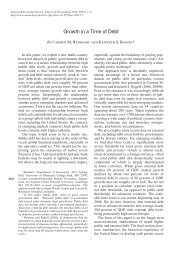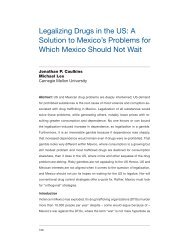The collapse of global trade, murky protectionism, and the crisis:
The collapse of global trade, murky protectionism, and the crisis:
The collapse of global trade, murky protectionism, and the crisis:
You also want an ePaper? Increase the reach of your titles
YUMPU automatically turns print PDFs into web optimized ePapers that Google loves.
<strong>The</strong> <strong>collapse</strong> <strong>of</strong> <strong>global</strong> <strong>trade</strong>, <strong>murky</strong> <strong>protectionism</strong>, <strong>and</strong> <strong>the</strong> <strong>crisis</strong><br />
Despite <strong>the</strong>se steps, <strong>trade</strong> finance has not been restored.<br />
<strong>The</strong> current effort is a race against time. While more financing capacity is provided<br />
by public institutions, it seems that <strong>the</strong> private sector's ability to respond to<br />
importers' <strong>and</strong> exporters' dem<strong>and</strong> for finance, particularly in developing countries is<br />
deteriorating even faster. For example, BAFT members have complained that <strong>the</strong><br />
series <strong>of</strong> measures announced by Export Credit Agencies <strong>and</strong> regional development<br />
banks were hard to track <strong>and</strong> that <strong>the</strong>y lack information on who is providing what,<br />
<strong>and</strong> under which criterion. Filling this information gap should be a high priority.<br />
Implementation <strong>and</strong> design <strong>of</strong> <strong>the</strong> programmes <strong>of</strong> <strong>the</strong> national export credit agencies<br />
may also need to be done cooperatively. <strong>The</strong> cooperation would involve <strong>the</strong> beneficiaries<br />
(exporters, importers, banks), <strong>and</strong> cooperation among all <strong>the</strong> export credit<br />
agencies in a region, if not <strong>global</strong>ly.<br />
Public institutions underst<strong>and</strong> that putting new credit or guarantee limits in place<br />
involves delays. For a long period <strong>of</strong> time, <strong>the</strong> private sector was comfortable to see<br />
government guarantees <strong>and</strong> programmes being withdrawn from export credit agencies'<br />
short-term business. Asking today for a 180 degree turn requires time but perhaps<br />
also discussion between potential customers about <strong>the</strong>ir needs <strong>and</strong> <strong>the</strong> suppliers. <strong>The</strong><br />
issue <strong>of</strong> financing both exports <strong>and</strong> imports has also been raised with some relevance<br />
by bankers <strong>and</strong> <strong>trade</strong>rs, as <strong>the</strong> survival <strong>of</strong> supply chains partly depend on <strong>the</strong> financing<br />
<strong>of</strong> both sides.<br />
<strong>The</strong> Asian example <strong>of</strong> export credit agencies supporting both intra- <strong>and</strong> extraregional<br />
<strong>trade</strong> by working as a network should be examined by o<strong>the</strong>r regions. In <strong>the</strong><br />
end, much has been talked about co-financing <strong>and</strong> co-risk sharing, but little has happened<br />
in reality.<br />
A realistic programme for <strong>the</strong> G20 <strong>and</strong> o<strong>the</strong>rs<br />
While <strong>the</strong>re appears to be no quick fixes to <strong>the</strong> <strong>trade</strong> finance problem, <strong>the</strong>re is still a<br />
case for a faster, better sequenced, <strong>and</strong> cooperative implementation <strong>of</strong> a series <strong>of</strong><br />
measures, many <strong>of</strong> which are underway. A programme <strong>of</strong> mutually supporting measures<br />
could be adopted as a "<strong>trade</strong> finance package" by G20 leaders. This package<br />
should include:<br />
• Accelerated implementation <strong>of</strong> IFC <strong>and</strong> regional development banks'<br />
enhancement <strong>of</strong> <strong>trade</strong> finance facilitation programmes.<br />
• Filling <strong>of</strong> <strong>the</strong> information gap as to what export credit agencies are doing by<br />
circulating a list <strong>of</strong> new programmes (unknown by most bankers).<br />
• Instructing export credit agencies to open quick <strong>and</strong> user-friendly liquidity <strong>and</strong><br />
re-insurance windows for both exporters <strong>and</strong> importers;<br />
• Coordinating actions by export credit agencies, possibly on a regional basis;<br />
• Creating liquidity pools allowing rapid co-financing between banks, export<br />
credit agencies <strong>and</strong> <strong>the</strong> International Financial Institutions;<br />
• Reviewing <strong>the</strong> Basel II regulation in light <strong>of</strong> <strong>the</strong> self-liquidating character <strong>of</strong><br />
<strong>trade</strong> finance.<br />
79





